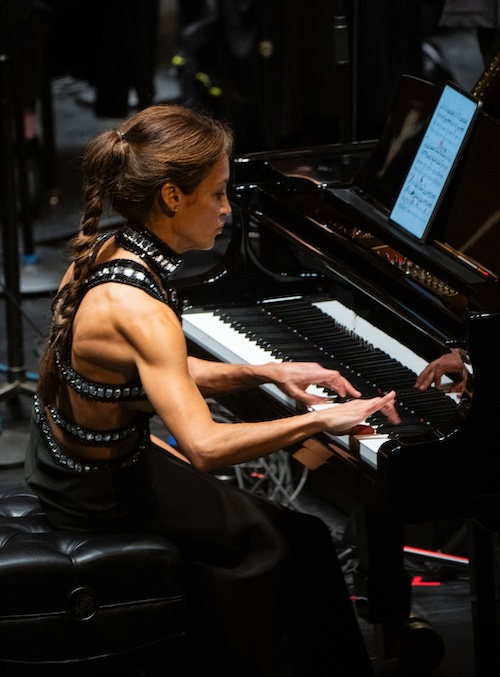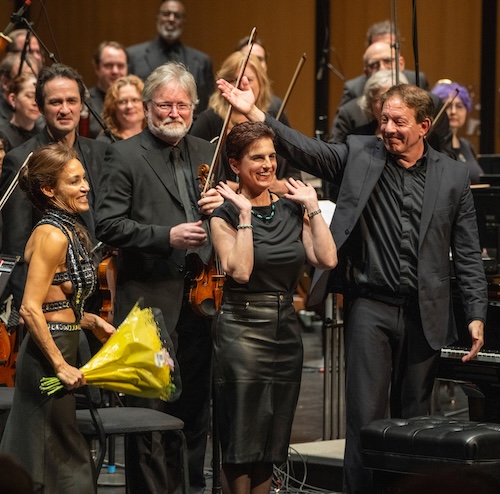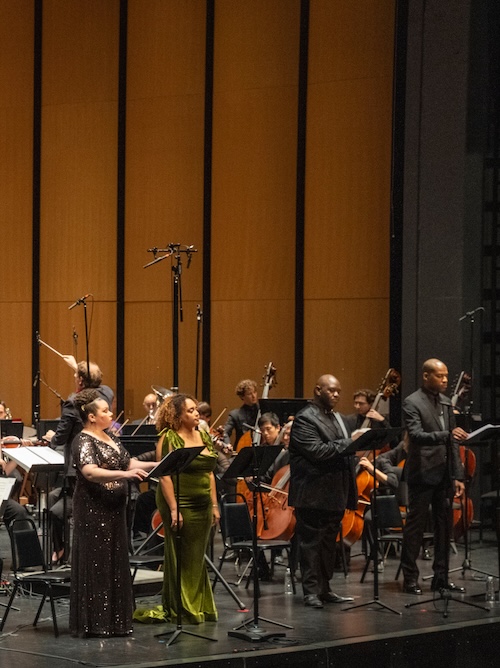Compelling Garrop premiere anchors Chicago Philharmonic’s Ear Taxi concert

Among the 210 composers whose music is being given this month as part of Ear Taxi Festival 2025, Stacy Garrop is the most prominent of those representing the city of Chicago.
No fewer than seven of her instrumental, chamber, choral and orchestral pieces are programmed throughout New Music Chicago’s hugely ambitious, monthlong celebration of contemporary concert music. Her prolific output and the remarkably assured quality of much of her varied catalogue amply justify her prominence in the event.
So the air was alive with anticipation on Saturday night when a large crowd turned up at the Harris Theater in downtown Chicago for arguably the most important of the festival’s 71 world premieres—Garrop’s first piano concerto, Invictus. The work’s dedicatee, pianist Marta Aznavoorian, was the soloist, accompanied by the Chicago Philharmonic led by artistic director and principal conductor Scott Speck.
The concerto debut shared the generous bill with the first Midwest performance of Illinois composer Damien Geter’s An African American Requiem.
To judge from the steady ovation given Garrop, Aznavoorian, Speck and the orchestra following this festival “anchor performance,” audience expectations were happily rewarded.
Garrop borrowed her title, Invictus, from the well-known 1875 poem of the same name by English writer William Ernest Henley. Each of the concerto’s four movements takes its expressive cue from a stanza of the poem, in the course of which an “unconquerable soul” struggles to surmount “the bludgeonings of chance” and “the Horror of the shade.” Fortunately the banalities of Henley’s verse are not reflected in Garrop’s accessible, exciting, shrewdly crafted music.
The subliminal scenario casts the piano soloist as protagonist, the orchestra as antagonist—a darkly oppressive force to be overcome through unflinching courage and determination. Garrop tailored the take-no-prisoners solo part to Aznavoorian’s formidable musicality and coruscating technique. The pianist swept through the brawny bravura with evident relish as she battled slithering basses, rippling strings and rattly percussion. So clear was the dramatic subtext that one could easily picture a hero being repeatedly beaten down but repeatedly coming back for more.
The eruptive clashes of the first and second movements (portions of which recall Prokofiev in his early hellcat vein) give way to a tenuous lyrical calm in the third section before further garrulous exchanges between keyboard and orchestra lead to a do-or-die finish. Triumphant chords signal the pianist-hero’s hard-fought victory as the music fades to a haze of tremolo violins.
Aznavoorian rose to the rigors of the big-boned solo part like the consummate virtuoso she is, clearly savoring her whiplash exchanges with Speck’s attentive players. The crackling energy they all brought to the occasion surely would have gladdened any composer’s heart—Garrop was all smiles as she bounded on stage to join in the bows.
It’s good news that the live performance will serve as the basis for a planned recording on Chicago’s Cedille label, which has done yeoman service on behalf of Garrop.

Geter, the festival’s composer-in-residence, had the inspired idea of interspersing his setting of the traditional Latin requiem liturgy with black vernacular musical elements (spirituals in particular) and modern texts concerned with racial violence as experienced by African Americans past and present.
His intentions as expressed in the twenty-movement African American Requiem are worthy, just as his skillful deployment of a raft of vocal soloists, chorus and orchestra—some 200 performers in all—yields several powerful sections: the driving rhythms of his “Confutatis” and “Lacrimosa” (the latter section undergirded by the National Anthem rendered in minor mode) are followed by the radiant fervor of his “Pie Jesu Domine” and, later, the joyous choral shouts and hand-clapping of “Kum Ba Yah” embedded in his “Sanctus.”

So much for the fleeting musical virtues. At nearly 90 minutes, An African American Requiem felt at once too much and not enough.
The biggest miscalculation, to these ears, was Geter’s incorporating a setting of “Lynching is Color-Line Murder,” a lengthy screed by the American journalist and early civil rights leader Ida B. Wells, as the would-be climax of the piece.
Referencing one of the most horrific chapters in American racial injustice, this would have served much better as the basis of a stand-alone composition. Here, however, the music merely traded in cliches while the inordinate length of the text was way out of proportion with the surrounding sections.
Worse, the sheer density of verbiage rendered most of the words a muddle despite the efforts of mezzo-soprano soloist Leah Dexter to sustain what felt in this context like an endless political diatribe.
She and her fellow soloists—soprano Tiana Sorenson, tenor Cameo Humes and bass Khary Laurent—gave their committed best, as did the massed voices of the Apollo Chorus (Stephen Alltop, music director) and the Philharmonic under Speck’s exacting command. This was said to be only the fourth U.S. performance of Geter’s 2019 opus, which was heartily received on Saturday.
Ear Taxi Festival 2025 runs through November 2 at various venues. eartaxifestival.com